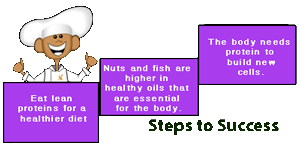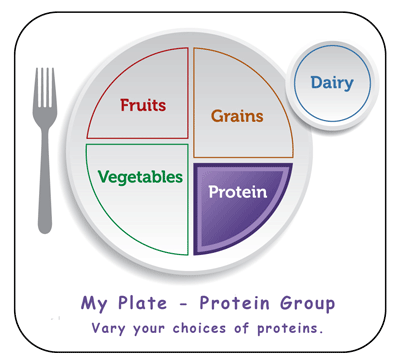Understanding the Health Benefits Of The Protein Group
 Protein is also called the building blocks for the body. The body needs protein to build new muscles, cartilage, skin and blood. It is also needed in order for the body to make hormones, enzyme and many other necessary cells. Protein is very important for children who are growing and for adults to replace cells and tissue.
Protein is also called the building blocks for the body. The body needs protein to build new muscles, cartilage, skin and blood. It is also needed in order for the body to make hormones, enzyme and many other necessary cells. Protein is very important for children who are growing and for adults to replace cells and tissue.
In fact, the USDA My Plate tells us that a healthy balanced meal has 1/4 of the plate filled with lean healthy proteins.
Most Americans eat a diet that has too much protein and choose the meats that are high in fat. To create a healthy meal, vary the kinds of protein your family eats to include other types of proteins like nuts, beans, peas and seeds.
Different proteins are high in a variety of vitamins and minerals. In general, foods from the protein group are high in the following nutrients:
-
niacin

-
thiamin
-
riboflavin
-
vitamin B6
-
iron

Seafood has some special nutrients. In fact, the USDA recommends that a few ounces of seafood be eaten every week. There is now concern about the amount of mercury that can be present in fish and shellfish. Find more information about seafood high in mercury. The nutrients found in seafood are:
-
omega -3 fatty acids
-
EPA
-
DHA
In particular, some meats and eggs are high in
-
cholesterol (fatty meats and egg yolk)
-
saturated fats
-
calories
Eating a diet that contains adequate amounts of lean protein can help your child by helping their body have the necessary nutrients to build the new cells and tissue required when growing. It also very important for adults. Both children and adults in your family will benefit because lean protein can help:
Healthy Eating

Healthy Child

Written by Maggie LaBarbera
•
Written on May 12, 2012
•
Last updated on Nov 24, 2013
 Protein is also called the building blocks for the body. The body needs protein to build new muscles, cartilage, skin and blood. It is also needed in order for the body to make hormones, enzyme and many other necessary cells. Protein is very important for children who are growing and for adults to replace cells and tissue.
Protein is also called the building blocks for the body. The body needs protein to build new muscles, cartilage, skin and blood. It is also needed in order for the body to make hormones, enzyme and many other necessary cells. Protein is very important for children who are growing and for adults to replace cells and tissue.

0 Comments